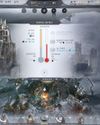
A lot of sci-fi ideas seem to have their roots in the ’70s. We don’t know whether it’s the availability of mind-bending drugs at the time, or the free love, or the fashions, but something seems to have sparked off a load of ideas that still seem modern today.
One of those ideas is the brain/computer interface (BCI), which you kind of expect Elon Musk to talk about in the same way he might discuss hollowing out a volcano, but sit up and take notice when Valve starts talking about it too. Research into them began in the ’70s, and earlier this year the UK Government received a report into them from the Parliamentary Office of Science and Technology, in which it was stated that entertainment companies are developing non-invasive BCIs “to play computer games”. This no doubt made a few honorable members wonder what a ‘computer game’ was, but the next sentence is even better: These products are currently being offered to consumers.
Non-invasive BCIs, which use sensors worn on the skull, are a world away from the invasive type Musk is implanting in the skulls of pigs, which he describes as “kind of like a Fitbit in your skull with tiny wires”. We’re not sure we’d want that, but for anyone who’s suffered a disconnection between their brain and the rest of their body, perhaps as a result of an accident, an implant may be able to reconnect the nerve signals.
هذه القصة مأخوذة من طبعة February 2021 من PC Gamer US Edition.
ابدأ النسخة التجريبية المجانية من Magzter GOLD لمدة 7 أيام للوصول إلى آلاف القصص المتميزة المنسقة وأكثر من 9,000 مجلة وصحيفة.
بالفعل مشترك ? تسجيل الدخول
هذه القصة مأخوذة من طبعة February 2021 من PC Gamer US Edition.
ابدأ النسخة التجريبية المجانية من Magzter GOLD لمدة 7 أيام للوصول إلى آلاف القصص المتميزة المنسقة وأكثر من 9,000 مجلة وصحيفة.
بالفعل مشترك? تسجيل الدخول

"The War Within itself has kept me coming back most evenings too"
WORLD OF WARCRAFT remains my jailer, and I couldn't be more pleased about it

OK BUILDER
SATISFACTORY is the new titan in building and crafting games

HELL YES
DIABLO IV: VESSEL OF HATRED is a transformative expansion

MOUSE: PI FOR HIRE
This mouse wants to be more than just a gimmick

WINDBLOWN
Dead Cells dev's new roguelike has me afraid for my free time

NO MORE ROOM IN HELL 2
As the zombie horde surrounded me just moments after taking down my two remaining teammates, the writing was really on the wall. Armed with just a chef's knife, it was clear I stood no chance, but I was going down swinging, hoping for a miracle... it didn't come.

OWNED BY STEAM
VALVE cordially reminds you that your games aren't yours

CURSE OF THE AZURE BONDS
These classic games haven't aged badly, but I sure have.

DEEP FREEZE
Endure a blizzard of tough choices and rough consequences in FROSTPUNK 2

NEW HORIZONS
Building up REMNANT 2 outside the live service game grinder